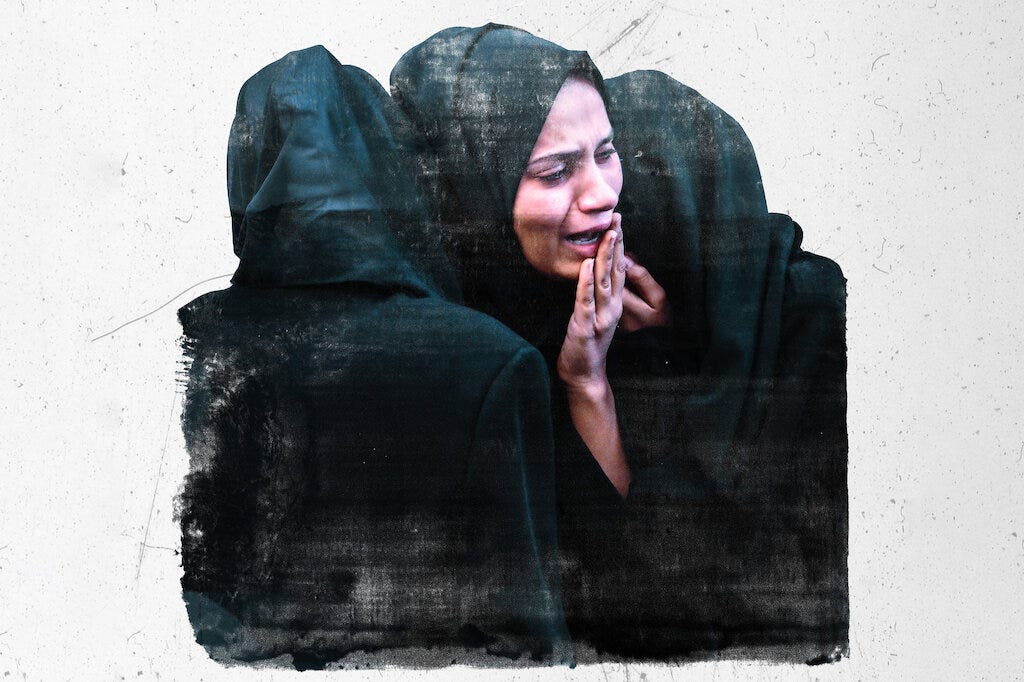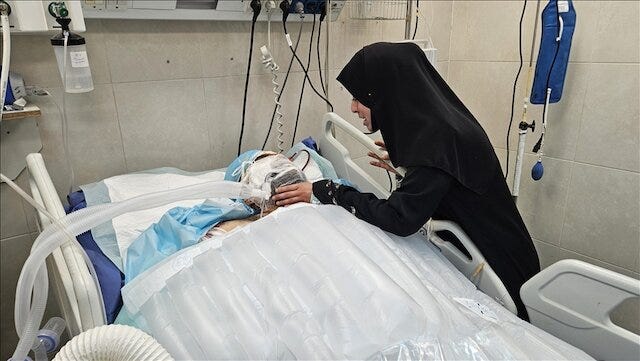Unbroken Amid the Ruins: The Enduring Strength of Gaza’s Women
How the Women of Gaza Stand as Pillars of Resistance and Humanity in the Face of War and Global Silence
In Gaza, where homes have collapsed into dust, hospitals have become graveyards, and schools lie in ashes, the women remain standing. They are not only survivors but also the narrators of a suffering that much of the world sees and quickly forgets. Today, the women of Gaza are not just victims of war; they are also victims of historical injustice, international silence, and media neglect. Raised under siege, hidden from bombs as children, mothers of martyrs in their youth, and targets themselves in middle age, their lives are marked by relentless adversity. Despite the efforts of the Zionist regime, supported by Western governments and the silence of the international community, to break the spirit of the Resistance by targeting women and children, these women remain unbowed.
The Tragedy of Dr. Alaa al-Najjar
A recent tragedy in the Qizan al-Najjar area on May 23 illustrates the depth of this suffering. Dr. Alaa al-Najjar, a pediatric specialist at Nasser Hospital in Khan Younis, left her ten children at home as she went to work, not knowing it would be the last time she saw most of them. That day, their house was bombed, killing nine of her children, including a six-month-old infant. As Dr. Alaa worked to save other children in the hospital, the bodies of her own children were brought in, so badly burned that even a final farewell was impossible. Her husband was injured, and only one child survived with severe wounds.
Dr. Alaa’s story is not unique. It is the story of thousands of Gazan women who, while fulfilling their roles as mothers, professionals, and caregivers, are forced to endure unimaginable loss and trauma. They must sometimes record the deaths of their own children, only to return moments later to care for others.
The Daily Battle of Being a Woman in Gaza
In Gaza, being a woman is itself a battlefield. Whether as doctors, aid workers, journalists, teachers, or ordinary citizens, women bear the heaviest burdens of war. Homes that should offer safety have been reduced to rubble, and arms meant to comfort are buried beneath debris. Yet, these women persist.
Dr. Alaa returned to work just six months after giving birth, driven by the conviction that as long as there is a child to save, she must be there. This spirit is echoed by countless women who, even under bombardment, choose life and resistance.
The violence inflicted on Gazan women is not only physical but also psychological, social, and structural. They are deprived of homes, loved ones, security, and even the right to mourn. The destruction of healthcare infrastructure puts pregnant women and newborns at grave risk. Mothers must watch helplessly as their children suffer due to medicine shortages, and girls are denied education because their schools have been destroyed.
The Quiet Power of Female Resistance
Despite these hardships, the women of Gaza refuse to break. They build makeshift schools under tents, share what little medicine they have, prepare food for the wounded, and sing lullabies to their children even as explosions echo around them. Their resistance is not in weaponry but in the determination to continue living: baking bread, tending a small garden, writing letters to prisoners, or simply raising their hands in prayer. Through these acts, they declare their existence and resilience.
The Danger of Global Silence
According to the Palestinian Ministry of Health, over 16,500 children and nearly 9,000 women have been killed in attacks by the Zionist regime. These numbers reveal that women and children are not collateral damage but primary targets. Entire families are often wiped out in a single strike, with no warning or chance to escape. This violence is perpetuated not only by weapons but also by the silence of international bodies, sanitised media coverage, and a lack of legal accountability.
While a single act of violence against a woman elsewhere can spark global outrage, the suffering of Palestinian women is often met with indifference. This normalisation of violence is itself a catastrophe, as it allows the world to become accustomed to the ongoing tragedy.
A Call Not to Forget
From Dr. Alaa al-Najjar to thousands of unnamed women, the pattern is clear: they give birth, care, resist, and become victims, all while the world looks away. The international community, media, and even women’s rights organizations must not allow this suffering to become routine. As Imam Khamenei has said, the world must not be distracted from the Palestinian issue, and must stand firmly against both the Zionist regime and its supporters.
The resistance of Palestinian women is not just symbolic; it is a cry for life, dignity, and humanity. It is our duty to hear this cry, to amplify it, and to stand against its silencing. These women are mothers, doctors, teachers, and human beings who deserve to live, not to be buried in ruins without even their names remembered. We must defend their right to life—by speaking out, protesting, boycotting, and refusing to remain silent.
Their endurance is a testament to the unbroken spirit of Gaza, and a reminder that even amidst the ruins, hope and humanity persist.



